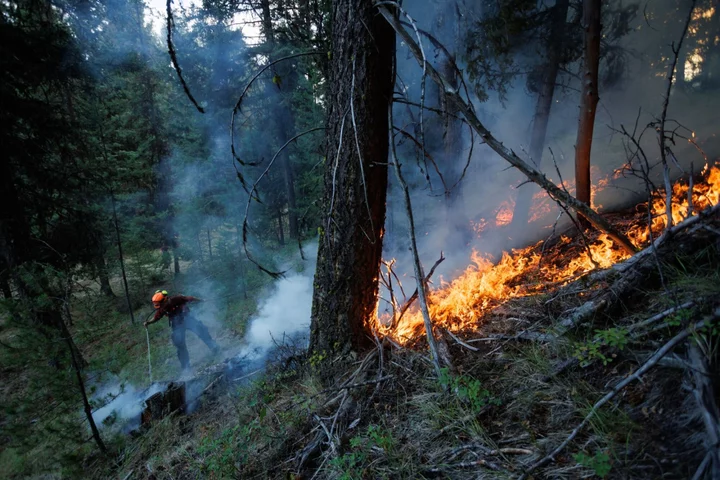Record-breaking wildfires in Canada are heading toward key population centers in the country’s west, prompting the province of British Columbia to declare a state of emergency and forcing tens of thousands to evacuate.
BC Premier David Eby declared the emergency on Friday in order to marshal all available resources to battle the blazes. Authorities had earlier made a similar decree in Kelowna, the largest city in the province’s Okanagan Valley, an idyllic tourist region known for its vineyards, orchards and ski hills.
About 15,000 people are under evacuation orders in British Columbia and tens of thousands more are under alert for possible evacuation, officials said at a news conference Friday evening.
“The situation is unpredictable right now, and there are certainly difficult days ahead,” Eby said at the briefing.
Meanwhile, the entire population of the Northwest Territories capital of Yellowknife, about 22,000 people, continued to flee with an evacuation deadline set for 12 p.m. local time Friday. Officials for the territory, which declared a state of emergency earlier in the week, said on Friday evening that about 19,000 residents have been cleared from the city.
Climate change has made heat and drought more extreme, leading to more intense wildfires globally from Hawaii to the Greek island of Rhodes. In Canada, the number of fires and the total area burned are both well above average for this time of year, having burned an area larger than Greece. Over the past few months, wildfires have disrupted oil and gas production in Alberta and sent choking smoke into Toronto, Ottawa and parts of the US, including New York City.
Wildfires Are Set to Double Canada’s Climate Emissions This Year
Prime Minister Justin Trudeau’s government is working with local authorities to assist in evacuation and firefighting efforts as wildfires remain “very active and unpredictable,” officials said at a briefing on Friday. The extent of the damage isn’t fully known.
British Columbia
In British Columbia, an evacuation order was issued for the majority of the city of West Kelowna, which lies on the other side of Lake Okanagan. The entire city of Kelowna, with a population of about 150,000 people, was on alert and evacuations had begun to the north of the city as well.
Satellite images indicated increased wildfire activity in the Western Canada province, and videos and photos from the area showed large fires engulfing trees and some buildings, strong winds fanning the flames and a sky filled with smoke.
Flights at Kelowna International Airport were canceled on Friday, after airspace surrounding the area was closed to allow aerial firefighting activity.
While the region is used to fires, British Columbia is experiencing the most destructive wildfire season on record, with an area nearly the size of New Jersey already burned.
This week marks the 20th anniversary of the 2003 Okanagan Mountain Park Fire, which destroyed hundreds of homes to the south of Kelowna but stopped short of reaching the city.
Northwest Territories
Meanwhile, a map of the Northwest Territories showed hundreds of wildfires including those burning to the north, west and east of Yellowknife, which sits on the north shore of Great Slave Lake, about 400 kilometers (250 miles) south of the Arctic Circle. Across the lake, an earlier evacuation in the town of Hay River had previously sent some evacuees to Yellowknife.
People lined the streets of the Northern city for hours, waiting to get on 22 evacuation flights scheduled for Friday while cars jammed the sole highway out of the capital. Officials said they expect to have moved several thousand people out by air by the end of Friday.
Officials are currently working to prevent further fire outbreaks and protect critical infrastructure in the city of Yellowknife, and military aircraft were deployed to evacuate people from hospitals and residents of long-term care facilities.
The decision by Meta Platforms Inc. to end news availability on Facebook and Instagram in Canada has prevented some evacuees from sharing articles on their social media platforms. A Meta spokesperson said in an email that Facebook activated “Safety Check” on Thursday for the Yellowknife wildfires to allow users “to let their friends and family know they are safe” and to “access updates from reputable sources.”
Author: Randy Thanthong-Knight

